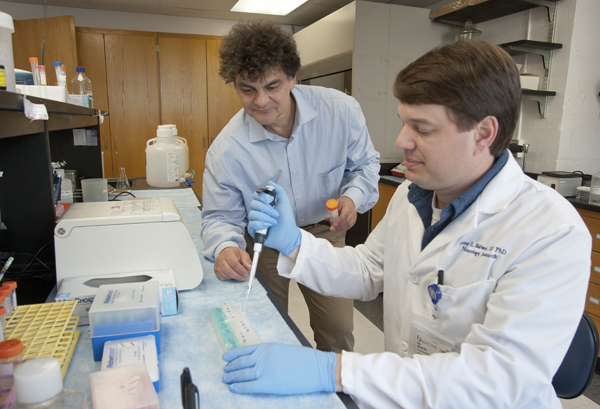Cancer-drug delivery patent could lead to shorter chemotherapy treatments

Two University of Mississippi Medical Center researchers were awarded a patent that could revolutionize how cancer drugs are delivered. The new approach is one that could cut down on the number of chemotherapy treatments required, a measure that could save patients from some of the side effects that come with the aggressive treatment.
Additionally, the change in delivering the drugs could allow treatment for certain cancers that currently aren’t viable for chemotherapy.
As a video plays depicting how Dr. Drazen Raucher and Dr. Lee Bidwell’s latest patent may destroy malignant tumors, Raucher offers a deeper explanation.
The UMMC biochemistry professor watches the arrow-like depiction that demonstrates how a peptide (arrow head) linked to a polypeptide shaft can deliver a different peptide (arrow fletching or vane) to cancer cells.
The pair’s patent is for this platform for delivering anti-cancer therapies only to tumors. If it proves safe and works in humans, it could reduce the amount of chemotherapy cancer patients need and therefore eliminate or reduce many side effects from it.
“Right now, you can’t give it at certain levels because it harms the patient. With this they (physicians) can selectively target the tumor,” Raucher said.
Heat makes it work.
Raucher said the blend is injected while the tumor is heated using MRI directed high intensity focused ultrasound. “The heat makes it aggregate, get stuck in the tumor and kill it,” he said.
Since it doesn’t work without heat, any part of the injection that lingers near healthy cells never reacts and instead breaks down in the body, reducing the side effects.
Using these peptides, small pieces of protein that interfere with the interactions of cancer-causing proteins, is a more specific way to destroy cancer cells, said Bidwell, an assistant professor of neurology.
“They’re really specific for their target, the cancer cells. They don’t bind with healthy cells,” Bidwell said. The drawback is that the peptides break down in the body. The platform they’ve developed is a way to stabilize them until they reach the tumor.
Among the major advantages of the process is how peptides can be designed to seek certain cancer cells, making it possible this method could fight cancers for which there are currently no good chemotherapies, said Bidwell.
Dr. Srinivasan Vijayakumar, director of UMMC’s Cancer Institute director, said advances such as this will make cancer treatment easier on patients and more efficient long term. “We love to see Cancer Institute members coming up with new ways to treat cancer that are easier on the patient and anticipate Dr. Raucher’s and Dr. Bidwell’s work will succeed in accomplishing this goal.”


